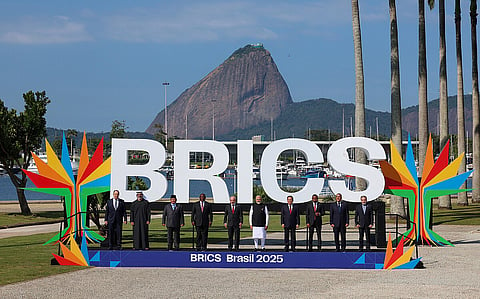

The BRICS summit in Rio de Janeiro, Brazil, convened leaders from Brazil, Russia, India, China, South Africa, and newer members including Indonesia, Egypt, and Iran, representing over half the world’s population and 40% of global economic output.
Brazilian President Luiz Inacio Lula da Silva likened the group to the Cold War’s Non-Aligned Movement, emphasizing its role in fostering multilateral diplomacy amid rising global conflicts and trade disputes.
The summit, held at Rio’s Museum of Modern Art, saw participation from Indian Prime Minister Narendra Modi and South African President Cyril Ramaphosa, while Chinese President Xi Jinping sent his premier, and Russian President Vladimir Putin joined online due to an International Criminal Court warrant.
U.S. President Donald Trump escalated trade tensions by announcing a potential 10% tariff on countries aligning with BRICS’ “Anti-American policies,” as stated in a Truth Social post:
Any Country aligning themselves with the Anti-American policies of BRICS, will be charged an ADDITIONAL 10% Tariff. There will be no exceptions to this policy. Thank you for your attention to this matter!
The U.S. is set to finalize trade deals before a July 9 deadline for imposing significant retaliatory tariffs, with tariff letters to be sent starting Monday noon, Washington time.
BRICS leaders criticized rising tariffs as a threat to global trade and condemned attacks on Iran and Gaza, while supporting Ethiopia and Iran’s World Trade Organization membership bids.
The BRICS group, now expanded to include regional rivals and major emerging economies, aims to reform global institutions like the United Nations Security Council and the International Monetary Fund.
Lula highlighted the need for a multipolar global order, noting, “If international governance does not reflect the new multipolar reality of the 21st century, it is up to BRICS to help bring it up to date.”
However, the bloc’s diverse membership raises questions about its unified goals, even as it explores initiatives like a cross-border payment system and a BRICS Multilateral Guarantees initiative to boost investment.
Brazil also used the summit to underscore developing nations’ commitment to climate action, with China and the UAE expressing interest in a proposed Tropical Forests Forever Facility.